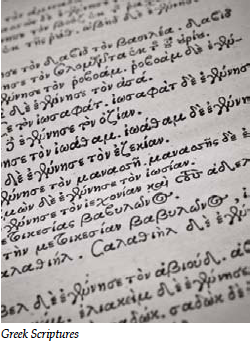Back to series



Inerrancy of Scripture
Click here to open a Print - Friendly PDF
Whereas inspiration concerns the origin of the Bible’s authority, inerrancy describes its nature. By inerrancy we refer not only to the Bible’s being “without error” but also to its inability to err (we might helpfully illustrate this point by comparing it to the distinction between Jesus’ sinlessness or being without sin, on the one hand, and his impeccability or inability to sin on the other). Inerrancy, positively defined, refers to a central and crucial property of the Bible, namely, its utter truthfulness.
The basis for the doctrine of biblical inerrancy is located both in the nature of God and in the Bible’s teaching about itself. First, if God is perfect—all-knowing, all-wise, all-good—it follows that God speaks the truth. God does not tell lies; God is not ignorant. God’s Word is thus free from all error arising either from conscious deceit or unconscious ignorance. Such is the unanimous confession of the psalmist, the prophets, the Lord Jesus and the apostles. Second, the Bible presents itself as the Word of God written. Thus, in addition to its humanity (which is never denied), the Bible also enjoys the privileges and prerogatives of its status as God’s Word. God’s Word is thus wholly reliable, a trustworthy guide to reality, a light unto our path.
If the biblical and theological basis of the doctrine is so obvious, however, why have some in our day suggested that the inerrancy of the Bible is a relatively recent concept? Is it true, as some have argued, that the doctrine of inerrancy was “invented” in the nineteenth century at Princeton by B.B. Warfield and Charles Hodge and is therefore a novelty in the history of theology? In answer to this question, it is important to remember that doctrines arise only when there is need for them. Doctrine develops when something implicit in the faith is denied; false teaching provokes an explicit rebuttal. This is as true of inerrancy as it is of the doctrines of the Trinity, or of justification by faith.
 The notion of the Bible’s truthfulness was implicitly assumed throughout the history of the church. Theologians were only reflecting the view of the biblical authors themselves. Jesus himself quotes Scripture and implies that its words are true and trustworthy—wholly reliable. The New Testament authors share and reflect this high estimate of the Old Testament. The question is whether this “high estimate” of Scripture pertained to its reliability in matters of faith and salvation only or whether it involved a trust in all matters on which the Bible speaks, including science and history.
The notion of the Bible’s truthfulness was implicitly assumed throughout the history of the church. Theologians were only reflecting the view of the biblical authors themselves. Jesus himself quotes Scripture and implies that its words are true and trustworthy—wholly reliable. The New Testament authors share and reflect this high estimate of the Old Testament. The question is whether this “high estimate” of Scripture pertained to its reliability in matters of faith and salvation only or whether it involved a trust in all matters on which the Bible speaks, including science and history.
One difficulty with this question is that it is anachronistic: it reflects the concerns of our times (including the dubious dichotomy between fact and value) rather than that of the Fathers and Reformers. With regard to the Fathers, we know that they held to the divine authorship of Scripture. Behind the many voices of the human authors is the voice of the Holy Spirit, the ultimate author of Scripture. While some used this as an excuse to search for hidden truths through allegorical interpretation, if anything the tendency was to ascribe too much truth to Scripture rather than too little. For the Fathers, to suggest that there were errors in the Bible would have been unthinkable.
Augustine, for instance, wrote that biblical authority would be overthrown if the authors had stated things that were not true. Though Augustine warned Christians not to hide their ignorance of scientific fact by easy appeals to Scripture, he also believed that the biblical writers did not make any scientific errors. True scientific discoveries will always be capable of being reconciled with the Scriptures. Augustine is at pains to show that there are no contradictions, either between one part of the Bible and another, or between the Bible and truth gleaned from elsewhere. Whatever we think of such attempts, they are at least compelling evidence of the widespread Patristic presupposition of the Bible’s truthfulness.
The Reformers similarly affirmed the truthfulness of the Bible. There is some debate among scholars whether Luther and Calvin limited Scripture’s truthfulness to matters of salvation, conveniently overlooking errors about lesser matters. It is true that Luther and Calvin are aware of apparent discrepancies in Scripture and that they often speak of “errors.” However, a closer analysis seems to indicate that the discrepancies and errors are consistently attributed to copyists and translators, not to the human authors of Scripture, much less to the Holy Spirit, its divine author. Calvin was aware that Paul’s quotations of the Old Testament (e.g., Romans 10:6 and Deuteronomy 30:12) were not always exact, nor always exegetically sound, but he did not infer that Paul had thereby made an error. On the contrary, Calvin notes that Paul is not giving the words of Moses different sense so much as applying them to his treatment of the subject at hand. Indeed, Calvin explicitly denies the suggestion that Paul distorts Moses’ words.
Doctrines are formulated in order to refute error and to preserve revealed truth. Just as biblical authority only became part of Protestant confessions in the sixteenth century to counter the idea that tradition is the supreme authority of the church, so the doctrine of biblical inerrancy was only explicitly formulated to counter explicit denials of the Bible’s truthfulness. These denials arose about the same time as did modernity and the distinctively modern way of interpreting the Bible: biblical criticism. Many so-called “enlightened” thinkers of the eighteenth century accepted the Deists’ belief that the source of truth was reason rather than revelation. Increasingly, the Bible came to be studied like any other book, on naturalistic assumptions that ruled out the possibility of divine action in history. Accordingly, biblical critics grew skeptical of Scripture’s own account of its supernatural origin and sought to reconstruct the historical reality. Advances in knowledge and a changed view of the world were thought to necessitate a rethinking of biblical authority.
Historical critics argued that the authors of the Bible were children of their age, limited by the worldviews that prevailed when they wrote. It was against this backdrop of widespread suspicion of the supernaturalist appearance of Scripture, and the virtually taken-forgranted denial of divine authorship, that the doctrine of biblical inerrancy, implicit from the first, was explicitly formulated (e.g., by Warfield and Hodge). What is explicitly expressed in the doctrine of biblical inerrancy, however, is not a theological novelty so much as an articulation of what was implicitly, and virtually always, presupposed through most of church history.
 What then does the doctrine of biblical inerrancy explicitly articulate? We can refine our provisional definition of inerrancy in terms of truthfulness as follows: The inerrancy of Scripture means that Scripture, in the original manuscripts and when interpreted according to the intended sense, speaks truly in all that it affirms. These specifications, by identifying the conditions under which Scripture speaks truly, do not hasten the death of inerrancy by qualification; they rather acknowledge two crucial limitations that enable believers to keep the doctrine in its proper perspective. Let us examine these two qualifications in more detail.
What then does the doctrine of biblical inerrancy explicitly articulate? We can refine our provisional definition of inerrancy in terms of truthfulness as follows: The inerrancy of Scripture means that Scripture, in the original manuscripts and when interpreted according to the intended sense, speaks truly in all that it affirms. These specifications, by identifying the conditions under which Scripture speaks truly, do not hasten the death of inerrancy by qualification; they rather acknowledge two crucial limitations that enable believers to keep the doctrine in its proper perspective. Let us examine these two qualifications in more detail.
First: the Bible speaks truly “in the original manuscripts.” We have already seen that the Reformers were able to affirm the truthfulness of the Bible and to acknowledge errors due to faulty translation or transmission. To the objection that we do not now possess the original manuscripts, it must be pointed out that textual critical studies have brought us extremely close to the original text. The relatively small number of textual variations do not for the most part affect our ability to recognize the original text. At the same time, it is important not to ascribe inerrancy to the copies of the originals, since these are the products of an all-too human process of transmission.
The second qualification is just as important: “when interpreted according to the intended sense.” It is often tempting to claim the same authority for one’s interpretations as for the biblical text itself. The thrust of the doctrine of inerrancy, however, like that of sola Scriptura, is to stress the distinction between the Word of God and the words of men. Interpretations of the Bible fall under the category “words of men.” It is thus important not to ascribe inerrancy to our interpretations. To the objection that we do not possess the correct interpretation, we must appeal not to inerrancy but to the perspicuity of Scripture. What conflicts there are about biblical interpretation ultimately must be ascribed to the fallible interpreter, not to the infallible text.
Does inerrancy do justice to the humanity of the Scriptures? Some critics of inerrancy have suggested that God had to “accommodate” his message to the language and thought-forms of the day in order effectivel to communicate. In taking on forms of human language and thought, does God’s communication simultaneously take on outmoded views of the world or of human nature? For example, could God speak truthfully of the sun “rising” when he knows full well that the sun does not move? In speaking of the sun rising, does not the Bible make a scientific mistake?
To this objection it may be replied that using the common language of the day is not the same as committing oneself to its literal truth. One must not confuse a social convention with a scientific affirmation. To say that the sun rises is to employ a metaphor—one, moreover, that is true to human experience. The objection proves too much: if the inspired authors have used ancient thought forms that led to scientific errors, would not these same thought forms have led to errors in matters of faith and practice too? After all, “To err is human”—or is it? Though proverbial wisdom equates humanity with fallibility, the paradigm of Christ’s sinless life shows that the one concept need not follow from the other. God’s Word, we may conclude, can take on human form—incarnate, inscripturate—without surrendering its claim to sinlessness and truth.
Does inerrancy therefore mean that every word in Scripture is literally true? There has been a great deal of confusion on this point, both in the media and in academia. It should first be noted that mere words are neither true nor false; truth is a property of statements. Second, those who oppose biblical inerrancy have all too often contributed to the confusion by caricaturing the notion of literal truth. Critics of inerrancy typically speak of “literal truth” when what they really mean is “literalistic truth.” Defenders of inerrancy must take great care to distinguish the notion of literal truth from the kind of literalistic interpretation that runs roughshod over the intent of the author and the literary form of the text.

Perhaps the best way to resolve this confusion is to begin at the other end. What counts as an error? If I say that my lecture lasts an hour, when in fact it lasts only fifty-nine minutes, have I made an error? That depends on your expectation and on the context of my remark. In everyday conversation round figures are perfectly acceptable; no one would accuse me of getting my figures wrong. In other contexts, however, a different level of precision is required. A BBC television producer, for instance, would need to know the exact number of minutes. The point is that what counts as an error depends upon the kind of precision or exactness that the reader has a right to expect. “Error” is thus a context-dependent notion. If I do not claim scientific exactitude or technical precision, it would be unjust to accuse me of having erred. Indeed, too much precision (“my lecture is fifty-nine minutes and eight seconds long”) can be distracting and actually hinder clear communication.
Let us define error, then, as a failure to make good on or to redeem one’s claims. The Bible speaks truly because it makes good its claims. It thus follows that we should first determine just what kind of claims are being made before too quickly ruling “true” or “false.” If error is indeed a context-dependent notion, those who see errors in Scripture would do well first to establish the context of Scripture’s claims. To interpret the Bible according to a wooden literalism fails precisely to attend to the kinds of claims Scripture makes. To read every sentence of the Bible as if it were referring to something in the world, or to a timeless truth, may be to misread much of Scripture. Just as readers need to be sensitive to metaphor (few would react to Jesus’ claim in John 10:9, “I am the door,” by searching for a handle) so readers must be sensitive to literary genre (e.g., to the literary context of biblical statements).
Is every word in Scripture literally true? The problem with this question is its incorrect (and typically unstated) assumption that “literal truth” is always literalistic—a matter of referring to history or to the “facts” of nature. It is just such a faulty assumption—that the Bible always states facts—that leads certain well-meaning defenders of inerrancy desperately to harmonize what appear to be factual or chronological discrepancies in the Gospels. In the final analysis, what was new about the Princetonians’ view of Scripture was not their understanding of the Bible’s truthfulness but rather their particular view of language and interpretation, in which the meaning of the biblical text was the fact—historical or doctrinal—to which it referred. Their proof-texting was more a product of their view of language and interpretation than of their doctrine of Scripture.

What if the intent of the Evangelists was not to narrate history with chronological precision? What if the Evangelists sometimes intended to communicate only the content of Jesus’ teaching rather than his very words? Before extending the Bible’s truth to include history or astronomy, or restricting to matters of salvation for that matter, we must first ask, “What kind of literature is this?” The question of meaning should precede the question of truth. We must first determine what kind of claim is being made before we can rule on its truthfulness. The point of biblical apocalyptic is quite distinct from the point of Jesus’ parables, from that of the Gospels themselves, or of Old Testament wisdom. We must, therefore, say that the literal sense of Scripture is its literary sense: the sense the author intended to convey in and through a particular literary form. Inerrancy means that every sentence, when interpreted correctly (i.e., in accordance with its literary genre and its literary sense), is wholly reliable.
The older term to express biblical authority—infallibility—remains useful. Infallibility means that Scripture never fails in its purpose. The Bible makes good on all its claims, including its truth claims. God’s Word never leads astray. It is important to recall that language may be used for many different purposes, and not to state facts only. Inerrancy, then, is a subset of infallibility: when the Bible’s purpose is to make true statements, it does this too without fail. Yet the Bible’s other speech acts—warnings, promises, questions—are infallible too.
The Bible’s own understanding of truth stresses reliability. God’s Word is true because it can be relied upon—relied upon to make good its claim and to accomplish its purpose. We may therefore speak of the Bible’s promises, commands, warnings, etc., as being “true,” inasmuch as they too can be relied upon. Together, the terms inerrancy and infallibility remind us that the Word of God is wholly reliable not only when it speaks, but also when it does the truth.

Kevin J. Vanhoozer
Professor, Senior Fellow for Systematic Theology, CSLI Kevin J. Vanhoozer is the Research Professor of Systematic Theology at Trinity Evangelical Divinity School; serves on the editorial board of the International Journal of Systematic Theology and the Journal of Theological Interpretation. He earned his M.Div. from Westminster Theological Seminary and a Ph.D. from Cambridge University. Previously, he served as Blanchard Professor of Theology at Wheaton College and as Senior Lecturer in Theology and Religious Studies at New College, University of Edinburgh. He has edited multiple books, including The Cambridge Companion to Postmodern Theology and Dictionary for Theological Interpretation of the Bible. He is the author of many books, most notably, Is There a Meaning in this Text? and The Drama of Doctrine: A Canonical-Linguistic Approach to Christian Theology.
 COPYRIGHT: This publication is published by C.S. Lewis Institute; 8001 Braddock Road, Suite 301; Springfield, VA 22151. Portions of the publication may be reproduced for noncommercial, local church or ministry use without prior permission. Electronic copies of the PDF files may be duplicated and transmitted via e-mail for personal and church use. Articles may not be modified without prior written permission of the Institute. For questions, contact the Institute: 703.914.5602 or email us.
COPYRIGHT: This publication is published by C.S. Lewis Institute; 8001 Braddock Road, Suite 301; Springfield, VA 22151. Portions of the publication may be reproduced for noncommercial, local church or ministry use without prior permission. Electronic copies of the PDF files may be duplicated and transmitted via e-mail for personal and church use. Articles may not be modified without prior written permission of the Institute. For questions, contact the Institute: 703.914.5602 or email us.
-
Recent Podcasts
Living in Wonder – Rod Dreher’s Story
by Rod Dreher, Jana Harmon on March 28, 2025Author Rod Dreher experienced profound encounters with the...Read More
-
The Surprising Imagination of C.S. Lewis
by Mark Neal, Aimee Riegert on March 21, 2025
-
From Addiction to Freedom – Bill Scott’s Story
by Bill Scott on March 14, 2025
-
Recent Publications
Does the Modern World Face a Crisis of Meaning?
by Cameron McAllister on March 1, 2025In recent years it seems like politics has...Read More
-
The Impact of Technology on the Christian Life
by Tony Reinke on February 14, 2025
-
C.S. Lewis and the Crisis of the Modern Self
by Thiago M. Silva on February 1, 2025
0
All Booked
0.00
All Booked
0.00
All Booked
23903
Fellows Program – Now Accepting Applications!
https://www.cslewisinstitute.org/?event=fellows-program-applications-available-on-february-1st&event_date=2025-04-15®=1
https://www.paypal.com/cgi-bin/webscr
2025-04-15

Next coming event
Days
Hours
Minutes
Seconds
Fellows Program – Now Accepting Applications!
On April 15, 2025 at 12:55 amCategories
Speakers

Kevin J. Vanhoozer
Professor, Senior Fellow for Systematic Theology, CSLI
Team Members

Kevin J. Vanhoozer
Professor, Senior Fellow for Systematic Theology, CSLIKevin J. Vanhoozer is the Research Professor of Systematic Theology at Trinity Evangelical Divinity School; serves on the editorial board of the International Journal of Systematic Theology and the Journal of Theological Interpretation. He earned his M.Div. from Westminster Theological Seminary and a Ph.D. from Cambridge University. Previously, he served as Blanchard Professor of Theology at Wheaton College and as Senior Lecturer in Theology and Religious Studies at New College, University of Edinburgh. He has edited multiple books, including The Cambridge Companion to Postmodern Theology and Dictionary for Theological Interpretation of the Bible. He is the author of many books, most notably, Is There a Meaning in this Text? and The Drama of Doctrine: A Canonical-Linguistic Approach to Christian Theology.




